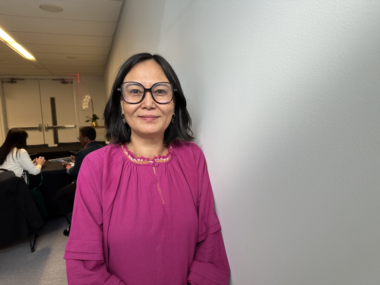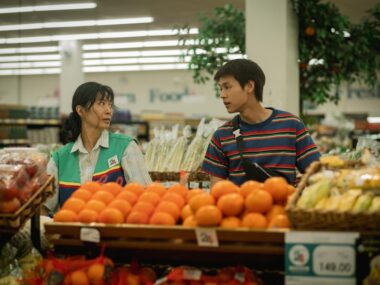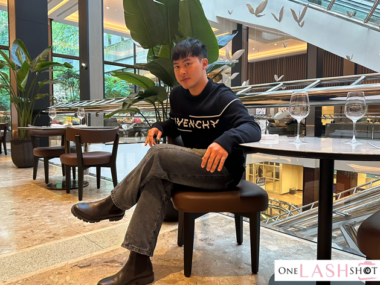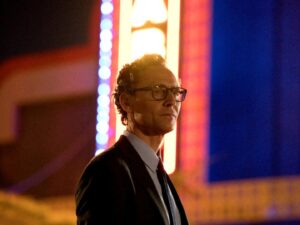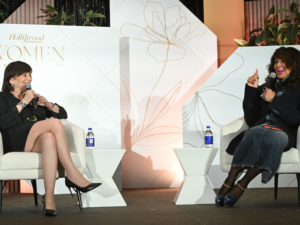Thodsapon Thiptinnakorn is one of the most popular screenwriters in Thailand’s film industry. His pen work has always been exceptional, culminating in a tremendous repertoire of consecutive box office hits.
Through the plots he developed for movies like The Teacher’s Diary (2014), May Who? (2015), Friend Zone (2019), and Love Destiny: The Movie (2022), he continues to grip the audience, with nary a second of boredom.
A full-time screenwriter with Thai film studio GDH, this was the first film to be initiated by Thodsapon. Once he completed the first draft of the screenplay for How to Make Millions Before Grandma Dies, development on the film began in 2020 following which the original script underwent several revisions after Pat Boonitipat was hired as director.
Inspired by his experiences caring for his grandmother during the COVID-19 epidemic and the consequences of her not leaving any property to her daughter or caregivers following her death, he submitted a ten-page summary of the project in December 2020.
One Lash Shot had the opportunity to speak with Scriptwriter Thodsapon Thiptinnakorn about the behind-the-scenes of How to Make Millions Before Grandma Dies.
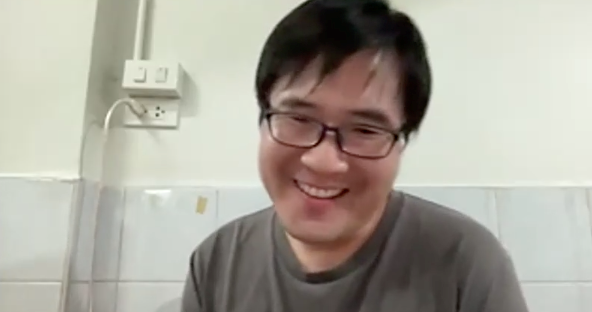
What made you become a scriptwriter?
I wanted to become a writer since my second year at university. I studied Communication Arts in college that’s how my passion for writing came. I started doing short films and through writing short films I realized that my talent and passion was for writing scripts.
Out of all the movies you have written storylines for, which one is your favourite?
I actually take pride in all the scripts I’ve written. But the one I am most proud of is the 2015 movie called May Who?. I thought that it was a very humorous and silly movie. I don’t know if it would work in today’s world, but that’s the movie that I am most proud of.

You have worked on several big productions with GDH especially Love Destiny’s movie version, which was based on the show of the same name. What made you work in a relatively different genre this time?
Since I am a regular writer for GDH, I had to be able to write a variety of scripts in different genres. I am very familiar with writing dramas, so How to Make Millions Before Grandma Dies is a drama at its core. I think it’s definitely something I have done before.
How To Make Millions Before Grandma Dies was originally the brainchild of you based on your 10-page synopsis regarding your experience taking care of your sick grandmother. Pat mentioned that the story was based about your own grandmother. Can you tell me the most similar aspects onscreen vs real life?
The heart of the story is my own experience and the script is still there. That’s always been a part of it. But Director Pat came and made the story more accessible to worldwide audiences.
The 10-page synopsis that I write initially had a more cinematic, movie-like tone. When Director Pat came in and created the movie with me, it felt way more natural and didn’t have too many dramatic or cinematic aspects. It just felt way more natural like a real family.
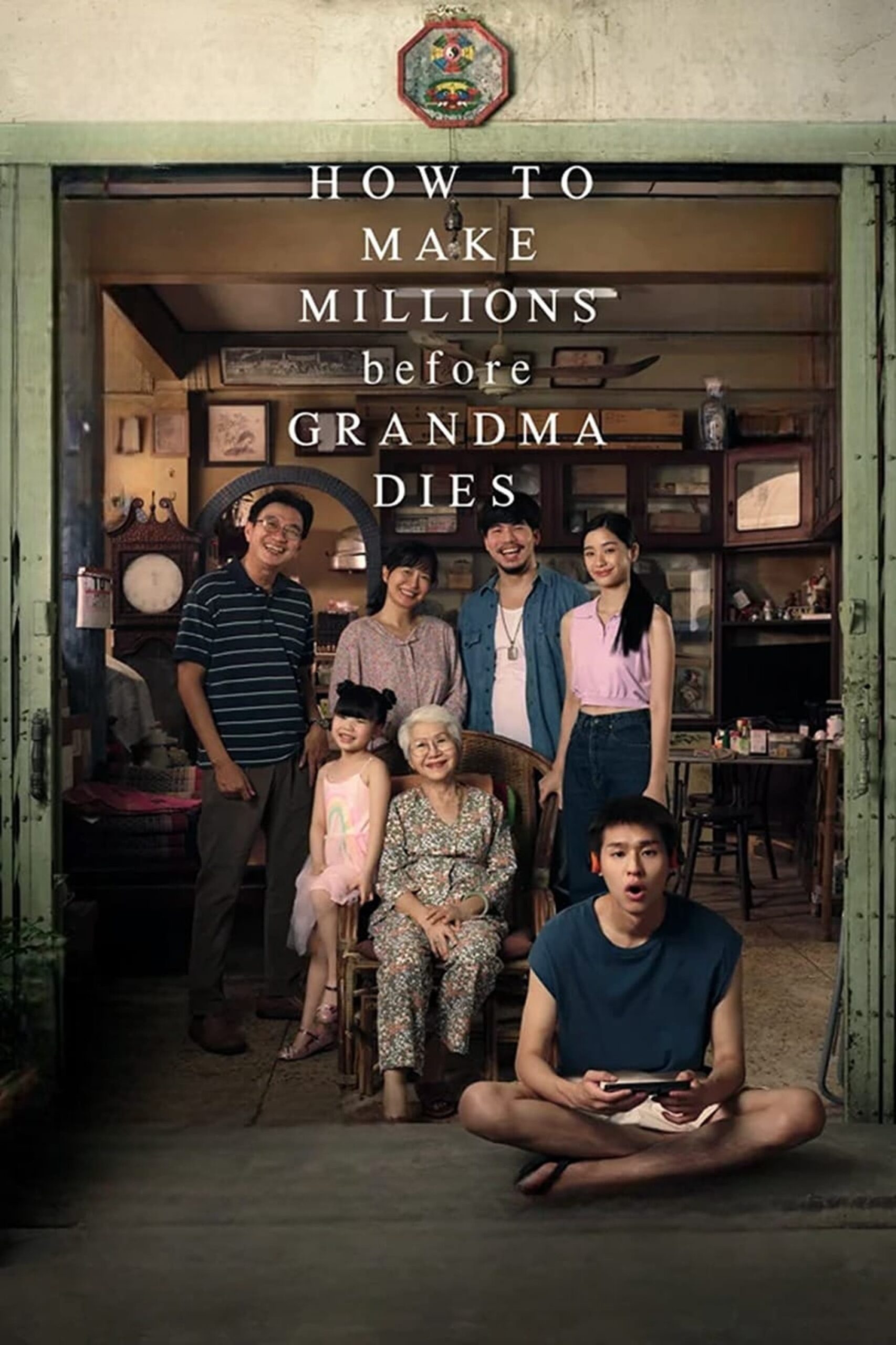
So which characters were based on your life and which situations actually happened in real life?
The mom and the uncle were based on real-life characters. I took some of my real experiences and mixed them with the newer elements of the script.
The event that was true was when M had to wait before he could meet the doctor, you know in the scene where they had to put the shoes on while waiting in the hospital line. That was based on my true experience.
The Qingming scene was also based on a real story. My grandmother wanted a huge burial site, a big grave, just like in the movie.
The scene where M knocks on the coffin, while in the car, was also based on my own experience. There’s a slight difference because he would throw coins so that the spirit would just chase and be around. That’s something that wasn’t in the movie, but I really experienced that.
The Qingming scene, in reality, in Thailand is way hotter than what the movie made it seem to be! The movie made it seem like it’s super windy and shady. It’s actually super-hot!
Your grandmother sold congee in real life and Pat mentioned that your mother was called to set to advice while shooting the scenes that congee was involved. Could you elaborate on that?
My grandmother did sell congee and my mother was often there as well. So, Director Pat called my mother to come in and make sure that all the scenes of pouring the congee and wrapping the bag were as true to reality as possible.
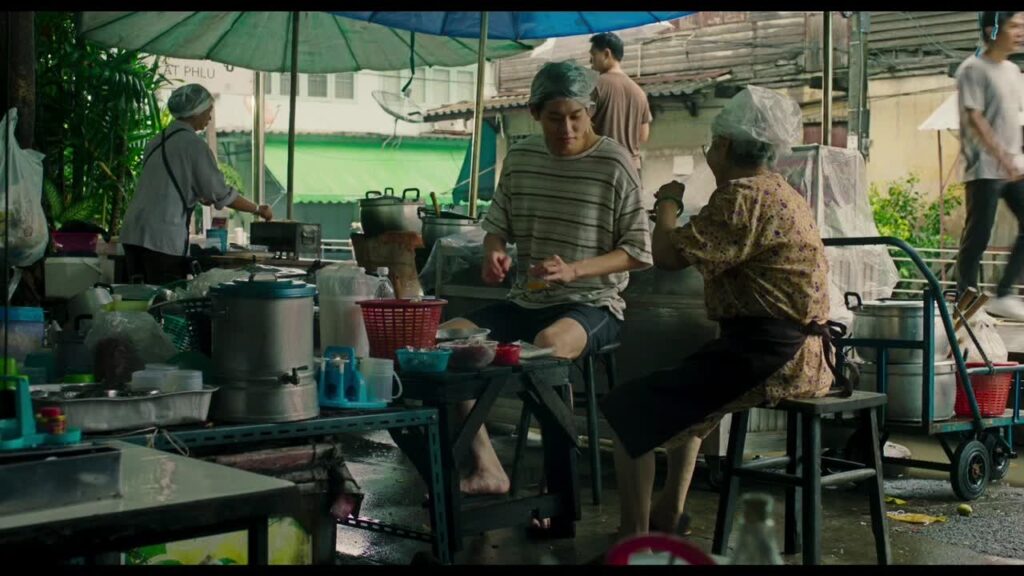
I still think of my grandmother’s flavour when cooking congee. My grandmother was often a little stingy with portions and flavours. Sometimes she would make it not as flavourful by watering it down a little bit. But my mother would make it way more flavourful than my grandmother. That was an experience that was memorable for me.
You have worked with several leading actors in Thailand from Ranee Campen to Nadech Kugimiya. Was Billkin and Usha your first choice to play M and Amah respectively in this extremely personal story?
At first, I wasn’t thinking about who was going to play the role. But after the producer and the director mentioned Billkin, I started to imagine Billkin as M and I felt that there was a resemblance to reality with Billkin’s acting.
For the grandmother, I did not really imagine a particular actress would play the role.
Pat mentioned that Mui’s character was based on someone you know in real life. Is that true?
The character is made up, but it’s based on my real cousin who took care of her grandma. But she wasn’t looking for inheritance or anything.
Do you believe grandparents should invest in their grandkid’s future (like the bank deposit started by Mengju for M when he was a kid), implying that the duty towards your kids doesn’t just end when they grow up?
I read a book. It was a book about taking care of elders. In the book, something that stood out to me was that before elderly people like a grandma/grandpa take care of other people, they should be able to take care of themselves. That notion kind of made its way into the movie.
What’s your opinion on caring for family members except maybe your kids? Do you think it’s possible to care expecting nothing in return?
From my perspective, I took care of my grandmother— I think it’s not wrong to expect something in return. But at the same time, I think it’s also not wrong to not expect something in return.
In your opinion, what was the most emotional scene in the movie that was difficult for you to write and shoot?
While writing, the scene that was most emotional for me, was when M was knocking on the coffin.
While shooting the movie, it’s the scene where Amah’s hair falls and M kind of grabs her hair. This wasn’t initially in the writing. During the writing, they were just sitting next to each other. But the scene where the hair falls and M grabs it makes it to the movie. That was the scene during the shooting process that was most emotional to me.
What are your thoughts on the movie being Oscar-shortlisted?
I never thought it was possible. While writing the script with Director Pat, we were watching movies that made the shortlist, movies that were winners and movies that didn’t win the awards. We felt it was so out of reach to be at that point!
[Author’s Note: Thank you to P’Ped for bringing so many incredibly emotional stories to the world and reaching us through your unbeatable penwork. Special thanks to Pat R. for providing translation as the responses in this interview was originally recorded in Thai.]


